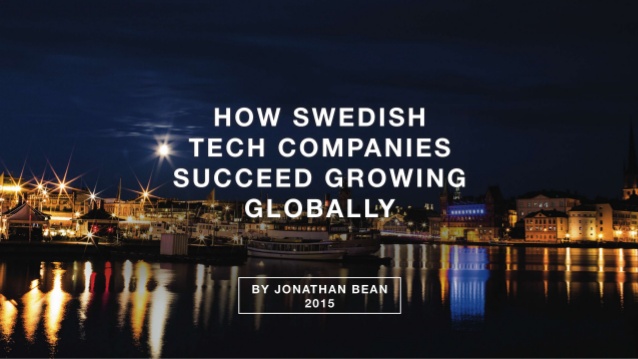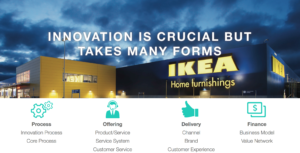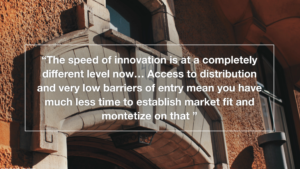Innovation in all aspects – the Key to Swedish Tech Success
After Silicon Valley, Stockholm produces the highest number of so called “unicorns” per capita. With a population of just one million people Stockholm has given birth over recent years to Skype, Spotify, Klarna and recently the gaming world has been focused on Stockholm with the $2.5b acquisition of Mojang (makers of Minecraft) and Activisions $5.9b acquisition of King Digital (makers of Candy Crush).
Over the last 10 years the Nordic region whilst only representing 2% of GDP is responsible for 10% of BUSD technology exits. Sweden is the leading country in terms of both investments and exits and now attracts the highest levels of venture capital investment (per deal) across all stages of fundraising (Seed, Series A, Series B).
But what makes this tiny city so successful in tech success. New research shows that a culture of innovation in all it’s forms key.

As part of a one year research project, Jonathan Bean the Chief Marketing Officer of the rapidly growing Digital PR SaaS platform Mynewsdesk investigated the key success factors behind the global success of some of Sweden leading tech success stories over the last 15 years. The methodology for this research was qualitative interviews with the founders, CEOs, leaders and investors in 13 Sweden technology success stories. This included repre
sentative from “unicorns” such as Spotify and Klarna. Following the importance of the entrepreneur and their initial team, innovation culture and capability was identified as a key success factor.

The fact that technology companies need to be innovative to succeed is not really news I hear you thinking. You are quite right. However what was significant in the research was the changing nature of innovation that is now required to succeed.
In terms of innovation, Sweden has a long and proud history of product and engineering innovation. This is embodied by the global success stories such as ABB, Ericsson, Atlas Copco and many others. The Swedish education system is globally admired for producing some of the best technical engineering talent from institutions such as KTH and Chalmers. Whilst this will continue to be important and a source of competitive advantage for the country this research demonstrates that it is not just the innovation of your product which is key to global success.
In a world where speed is perhaps the most important currency in business a culture of innovation needs to be developed across the entire organization. For senior leadership this means reviewing four clear areas.
Process
Do you have a clearly defined innovation process which includes everything from ideation, project selection, execution and evaluation. In addition have you reviewed your existing core processes to see what new ways of working can be introduced to drive efficiency or take advantage of advances in technological change or globalization.

Offering
Innovation in your product and service will of course be vital. But product innovation alone will not be enough. Looking at how you innovate and automate customer service is key. Never have there been more ways to connect with customers and gain useful and rapid feedback that can be used to iterate and improve product and service delivery.
Delivery
Many of the companies in this research were founded before the invention of the smart phone, app stores and social media advertising monetization. Delivery innovation in terms of channel, brand or customer experience is key today. Those companies founded in the last 5 years are all taking advantage of this form of innovation and see it many see it as more important than product innovation
Finance
Innovation of your business model and acknowledgement of value networks and ecosystems as opposed to value chains that your company exists within is the final innovation play that is important. Clearly the Swedish “unicorns” Spotify and Klarna embody this type of innovation, completely re-imagining the business model around music and payments.
So it is innovation in all its forms that will be important if Sweden wants to retain its record for being a “unicorn factory”.

As one of the most prolific serial entrepreneurs quoted during Jonathan Beans research, “its now all about speed of innovation.” Barriers to entry are so low and access to distribution is so easy that is now all about speed and establishing product/market fit and monetization before your global competition.
So what can we learn from all these technology success stories. Well one thing is guaranteed, whether you are a fresh market entrant or a company with an established market position, a culture of innovation across your entire company will be needed for you to survive and thrive. Innovation strategy, process, project selection and execution should be embraced by all senior leaders. If it is a profitable and growth filled future awaits. If it is not then the challenge for you will be short term profit maximization whilst managing declining growth rates, long term margin erosion and ultimately death through M&A if you are lucky.
If you fully want to understand your own innovation capability for success, in line with the newest research on the topic, it is possible, and a good start is to go for a first free analysis with Innosurvey.

